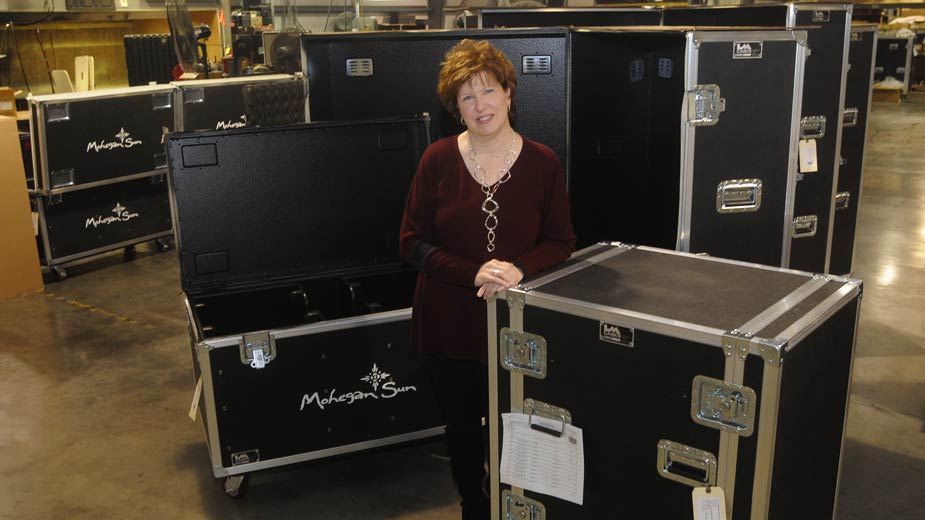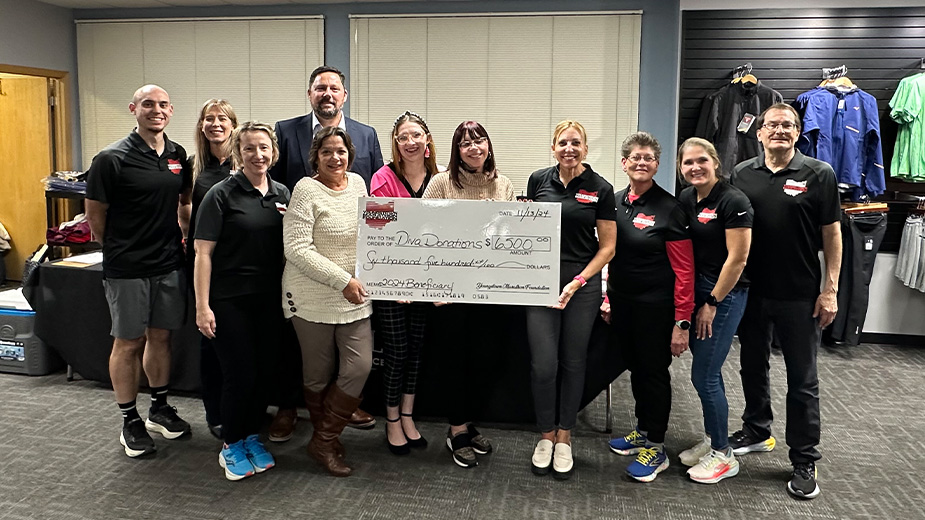Staplers to Missile Launchers: Uncle Sam Buys It All
YOUNGSTOWN, Ohio — Uncle Sam might not want you, but he might want what you sell.
That’s because the United States government buys everything. There are the big projects – sleek new fighter aircraft, missile defense systems and high-end aerospace equipment for unmanned interplanetary travel.
Then, there are the millions of products that define the word mundane – waste paper baskets, soap dispensers, plastic wardrobe hangers, staplers, the bolts and screws that went into building that new fighter jet, and countless other household items and services that small businesses provide the federal government every year.
“They buy it all,” says Norma Webb, procurement specialist at the Mahoning Valley Procurement Technical Assistance Center. “It’s not just weapons, but food, janitorial supplies, furniture. Everything.”
The Procurement Technical Assistance Center, or PTAC, is administered locally through the Mahoning Valley Economic Development Corp., the Western Reserve Port Authority and the Ohio Small Business Development Center at Youngstown State University. The agency is designed to help small businesses navigate the cumbersome process of securing a government contract.
“There are millions of dollars out there,” Webb says, and the government is constantly searching for new companies to do business with. “The government buys absolutely everything,” she says, “and not all of it is purchased directly.”
Webb has found little enthusiasm locally in the private sector to do business with the U.S. government. This could be because of several factors. First, there is the misunderstanding that the government might not be in the market for your service or product. Second is the misperception that doing business with the government is more hassle than it’s worth, and that small business simply cannot spare the time and money it takes to secure a contract, she suggests.
“I’m working really hard to get interest built up,” Webb says. “People have heard so many bad things about the government that they’ve become afraid of the red tape and paperwork. That’s why they created the PTACs to help with that.”
In fact, there is significant amount of dollars that flow into Ohio each year from the federal government. According to USASpending.gov, a government website that tracks federal spending and contracts, more than $5.3 billion worth of business was contracted with Ohio companies or organizations during fiscal 2016. So far in fiscal 2017, Ohio firms had secured $1.279 billion in services.
In the Mahoning Valley, Trumbull County landed the largest chunk of federal dollars – $30.5 million – associated with contracts during fiscal 2016, according to the government. Manufacturer Ajax Tocco Magnethermic, Warren, won contracts with NASA and the U.S. Department of Defense while Mike Coates Construction of Niles was awarded a $7.8 million Department of the Army contract for the construction of the indoor firing range at the Youngstown Air Reserve Station.
Mahoning County companies were awarded $7.1 million in government contracts in fiscal 2016, data show. Valley Foods Inc. of Youngstown, which supplies packaged meals for National Guard units and the armed forces, secured more than $2.3 million in government business.
Companies in Columbiana County received $11.2 million in contracts in fiscal 2016, led by Hunt Valve Inc., Salem, which secured $928,424 worth of business.
Webb says that her agency last year helped 25 companies in the three-county region land roughly $4 million in government business. “I have about 200 companies on my client list and about half are manufacturers,” she says, but not all do business with the government every year, she clarifies.
The Department of Defense usually purchases more than any other department in the federal government, Webb says. That could rise, because President Trump’s proposed budget includes a $54 billion increase in defense spending. “I’m sure it will lead to some increases,” Webb says, “but we don’t know what they’re planning to buy yet.”
She emphasizes that the service her office provides is free of charge. “I don’t give out contracts, but I can help find contracts that you can bid on,” she says. The office helps clients with the blizzard of paperwork the government might require, any registrations, information and advice on regulations, and ensuring a company has the proper certifications in place.
“PTAC has been great in helping us navigate the challenging world of government contracting, but the work and research will ultimately fall on your own shoulders,” says Joel Kendall, president of 45Press, an information technology company based in Austintown.
Kendall’s company recently secured business with the federal government, he says, but the process is exhausting and companies will likely have to exercise great patience before seeing any returns. “Things with the federal government do not move as quickly as they do in the private sector,” he says. “But there can definitely be a payoff if you’re willing to put the time and effort towards it.”
And there is paperwork – a lot of paperwork – as several companies discovered during a workshop PTAC hosted at the Ohio Small Business Center at Youngstown State University March 21.
The workshop presented an overview of the General Services Administration (GSA) Schedule, a sort of online marketplace where government agencies can go to purchase products from qualified vendors. However, placement on the GSA Schedule is neither quick nor easy, and just because your company’s products are available through the site is no guarantee that the government will buy them.
“It’s not a replacement for marketing,” Webb says. “You still have to market, market, and market your product.”
To be accepted on the GSA Schedule, a company must be in business a minimum of two years, demonstrate financial stability and past performance, and sell products that are commercially available. Moreover, at least half of the product must be manufactured in the United States. To remain in good standing on the schedule, your company must achieve $25,000 in combined sales for the first two years and $25,000 every year thereafter.
“Buy a big binder for paperwork,” laughs JoAnn LaGuardia, president of LM Cases in Youngstown. Her company manufactures durable cases that the U.S. military has used. In 2011, for example, the company won a contract to manufacture cases for the Marine Corps that held solar panels deployed in Afghanistan to provide power for military operations there. The company’s cases have also been used to store military band equipment, she says.
LaGuardia says that she would like to expand this segment of LM’s business and is exploring the use of the GSA Schedule as a means of selling her company’s products.
“We know that the government purchases our product,” she says. “But finding those opportunities is very difficult.”
LM employs 20 at its 40,000-square-foot manufacturing plant in the Salt Springs Business Park, a mixture of CNC automation and old-fashioned custom assembly by hand. Another line of plastic cases on which the company performs value-added work are more standardized, LaGuardia says, and could easily be sold on the GSA Schedule. In addition, the company is 100% female-owned, which has its advantages when competing for government contracts.
“The GSA Schedule puts you in front of them,” LaGuardia says. “It’s maddening to compile all of the data they require, but I’m going to dedicate the time to do it.”
Webb says it could take between eight and nine months before a company is approved for the GSA Schedule, which could be challenging for a small business.
“It requires a lot of preparation, so it’s a detriment starting out,” says Cris Young, executive vice president of Hudson Fasteners, Youngstown, which sells fasteners such as metal screws and bolts. The one drawback is that the bulk of these products today come from overseas. However, Young says the company has identified one supplier that manufactures its product in the United States, which would meet GSA criteria for a domestically produced item.
“We’ve narrowed it down to a niche product line,” she says.
Registering with the GSA could help carve a brand-new revenue stream for the company, Young says. “I don’t expect to get rich, but if we could get 15% to 20% of our business coming from this revenue stream, I’d be happy,” she says.
Hudson Fasteners, also a female-owned company, is based out of the Youngstown Business Incubator and sells its products via its website, Young says, and the GSA Schedule seems a logical opportunity. “Our hope is that once the paperwork is done, we could hire a full-time person to market us,” she says. “We’re in this for the long haul and we’re going to put forth the effort.”
Pictured: JoAnn LaGuardia, president of LM Cases, says she wants her company to boost its sales to the U.S. government.
Copyright 2024 The Business Journal, Youngstown, Ohio.



